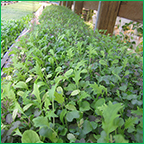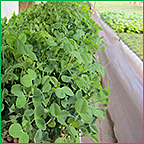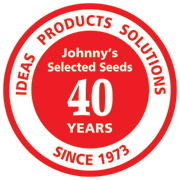- Johnny's Farm Visits & Grower Profiles
- Johnny's 2021 Grower Profiles
- Johnny's 2020 Grower Profiles
- Johnny's Tools Advisor Eliot Coleman: Celebrating Over 20 Years of Partnership | Johnny's Selected Seeds
- Late-Summer Recipe Preview with Farmer-Chef Frank Giglio | Three Lily Farm, Thorndike, Maine
- Johnny's Selected Seeds Visits Martha Stewart's Farm in the Hudson River Valley
- Javier Zamora of Javier Sanchez Medina (JSM) Organics Farms | Royal Oaks, California | Johnny's Farm Visits & Grower Profiles
- Farm Visit: 4-Town Farm, Seekonk, Massachusetts | Johnny's Selected Seeds 40th Anniversary
- Grower Profile: Selwood Green, Walton & Halifax, Nova Scotia, Canada | Johnny's Selected Seeds 40th Anniversary
- Grower Profile: Peach Crest Farm & Cooper Organics, Stratford, Oklahoma | Johnny's Selected Seeds 40th Anniversary
- Farm Visit: Paradise Farms Organics - Homestead, Florida | Johnny's Selected Seeds 40th Anniversary
- Grower Profile: Growing Power Urban Farm - Milwaukee & Madison, WI & Chicago, IL | Johnny's Selected Seeds 40th Anniversary
- Grower Profile: Slegers Greenhouses - Strathroy, Ontario, Canada | Johnny's Selected Seeds 40th Anniversary
- Grower Profile: Gathering Together Farm - Philomath, Oregon | Johnny's Selected Seeds 40th Anniversary
- Grower Profile: Pleasant Valley Farm - Argyle, New York | Johnny's Selected Seeds 40th Anniversary
- Farm Visit: Mark's Melon Patch – Dawson, Georgia | Johnny's Selected Seeds 40th Anniversary
- Grower Profile: Louie's Pumpkin Patch - Skövde, Sweden | Johnny's Selected Seeds 40th Anniversary
- Grower Profile: Living Water Farms - Strawn, Illinois | Johnny's Selected Seeds 40th Anniversary
- Farm Visit: Circle Fresh Farms - Denver, Colorado | Johnny's Selected Seeds 40th Anniversary
- Grower Profile: Freedom Farm - Freedom, Maine | Johnny's Selected Seeds 40th Anniversary
Living Water Farms • Strawn, Illinois
40th Anniversary Grower Profile — March 2013
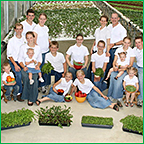
Denise and Kevin Kilgus started gardening when they were married 30 years ago. Over the years, their efforts ranged from a backyard garden for their family of eight children to a collaboration with other local growers supplying a local grocery store.
"Living in the country, you need things for your kids to do," Denise said. "We believe in chores, so we have always had a garden."
About 5 years ago, assessing the amount of work they were doing in the garden, the Kilgus family decided it was time to either get serious about market farming — or give it up.
They got serious. Today they operate Living Water Farms in Strawn, Illinois, which consists of 9000 square feet of hydroponic greenhouse production. Six family members work in the business full or part time, and they employ numerous other local people to help with their year-round production. They deliver to restaurants, distributors, and supermarkets in Chicago, St. Louis, and Springfield, Illinois.
Diving into Hydroponics
Kevin and Denise have six daughters and two sons, three daughters grown and married, and five children ages 11 to 18 still at home. It was their second-oldest daughter, Natalie, and her husband Mark Schneider, who led them into hydroponics.
"We had been talking about how we could grow in central Illinois and maintain a year-round family business," Denise said. "Mark visited a relative who had a hydroponic greenhouse back East, and he came back from that trip so pumped up. Shortly after, he went to a hydroponic tomato workshop, where he met a grower from Minnesota who agreed to serve as a consultant, and in 2008 we built our first greenhouse."
At first, they experimented with multiple crops: cucumbers, green beans, tomatoes, edible flowers, herbs, head lettuce, and salad mix. Eventually they settled on specialty greens because of the year-round demand for them.
"From Day 1, we were trying to find something almost every restaurant would use," Denise said. "We've definitely broadened our horizons beyond lettuce. We grow Asian greens, collards, bitter greens, arugula, micro-greens — there are so many things chefs want. Those are all on 4–7-week (growing) cycles. Per square foot, it made the most sense to grow greens, and the market was there."
Forging Relationships and Sustainability
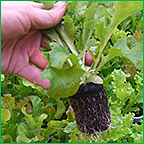
That market had to be developed, though, which the family pursued by meeting with chefs and buyers, running the deliveries themselves as much as possible.
"The relationship is very important," she said. "We're finding that it opens a lot of doors. Chefs put our name on their menus, and advertise our produce as locally grown."
Sustainability efforts at Living Water Farms are also important to customers. Those include using geothermal energy to heat the greenhouses, growing in compostable peat/coir pellets, coordinating with other growers on deliveries, and using a hydroponic growing system that uses about 1% of the water required for field-grown lettuce.
A Steep Learning Curve
Apart from hiring a consultant, the family learned the technical aspects of the hydroponics business by reading, workshops, and trial-and-error. They started with hand watering and manual controls of lighting and temperature, but soon graduated to automated systems.
Living Water Farms uses pellets of peat/coir for most of their greens. Denise explained the process: "The seeds are started in a germination room that is temperature- and humidity-controlled. Once the seed coat has cracked open, they are taken to a nursery rack where they have plenty of light and are watered occasionally. The next stop is the ebb-and-flood tables, where the plants are separated and automatically watered and drained several times a day. After approximately 3 weeks, they are transplanted into the lettuce benches where they are watered 24/7 by NFT."
NFT stands for nutrient film technology or nutrient film technique , a hydroponic system in which a shallow stream of water and dissolved nutrients is recirculated past the plant roots. The flow is so shallow it's barely a film of nutrients, hence the name. The plants are harvested with the growing media attached, which provides optimal storage life.
Living Water Farms also grows micro greens and pea tendrils on "micro towers" of seedling flats. Watered intermittently throughout the day, these crops have a 1–3-week growing cycle, at which point they are cut and packed into clamshell containers.
Supplemental lighting is available year-round to keep plant growth on schedule. Sensors in the greenhouses track available light and allow supplementation when daylight is insufficient, as it usually is on winter days — but can also be on overcast summer days at a latitude of 40.65° North.
Automation does not mean the greenhouse runs itself, however. There is work to do every day, planting seeds, transplanting and moving plants in the greenhouse, harvesting, and packing. There is also the complicated matter of scheduling; to stay profitable, the greenhouses must be full all the time, and there are a lot of logistics involved in scheduling multiple crops.
Denise was running the day-to-day operations for the first couple of years with help from the family and a couple of full-time employees. "When we saw the amount of hours needed, that's when Mark decided he would come here full time," she said. Her son-in-law, who had been a firefighter, took over sales and greenhouse maintenance. Later, his brother Matthew Schneider joined their team as CFO and greenhouse manager. Two of Denise and Kevin's five children, still at home, work in the business and all family members fill in when needed. Kevin still works as an agronomist for an ag business, but stays involved and interested in the greenhouse business.
As Denise reflected on the evolution and growth of Living Water Farms, she again referred to the steep learning curve the family experienced getting started in hydroponics.
"It's a lot of work, and there were a lot of upfront costs," she said. "There were some pretty rough days when we started. But it's back to being fun now."
- To learn more, visit the Living Water Farms website.
- Images reproduced with permission from Living Water Farms. All rights reserved.
- Browse all Johnny's 40th Anniversary Farm Visits & Grower Profiles.



